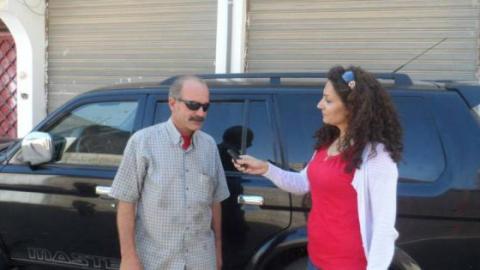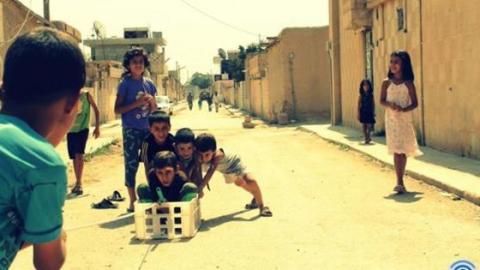It is exceedingly rare, if not impossible, to find an Arab Syrian who speaks Kurdish. On the other hand, there is hardly any Kurd who does not speak Arabic. This is but one expression of the totalitarian dogma that worked to disenfranchise and exclude the Kurdish language and culture from the Syrian cultural sphere in favor of an exclusionist and monotone Arab identity that was instrumental as a tool of oppression against the population.
Thus becomes the establishment of Arta FM, Syria’s first Kurdish-language radio station, an extraordinary event in a country where Kurds were arrested for simply conversing in their mother tongue. The radio station broadcasts from Amuda, one of the first towns to join the protest movement against the dictatorship. The symbolic value of this event, as a direct product of the Syrian uprising, prompted Syria Untold to attempt and document the story of the radio station from its very beginnings. Despite the difficult transitional periods in some parts of liberated Syria, initiatives along this line could serve as inspiration and encouragement towards a brighter future for the country.
Arta FM presents itself as the “radio of the citizens, for the citizens,” and a “community radio station… with a socially committed line, without any political, religious, ideological or party-related agendas.” Its main commitment is presented as the strive to “create a secular and democratic civil society in Kurdish areas within a united and democratic Syria,” because, “accepting this diversity will only enrich Syria during its transitional period.” This commitment is reflected in its staff with its varied backgrounds (Kurdish, Arab and Syriac) and its multilingual lineup of programming. This embrace of Syria’s diverse cultures makes the station accessible to everyone regardless of “their party affiliation, or lack thereof, whether religious or atheist, educated or illiteratee, young or old.”
According to founder Sirwan Hajj Barko, who worked at the German radio station WDR since 2005: “Our dream was to establish a radio station at home, where we can contribute to make a difference on the ground.”
The project was presented to several media organizations in Europe and the US, and funding was secured through the Swedish International Development Cooperation Agency (SIDA) and other organizations supported by the US government. This first step was followed by training programs for 100 journalists conducted in Kurdistan, Turkey and Jordan to serve as radio broadcasters. In the words of Hajj Barko to Syria Untold:
"The station is currently staffed by more than forty people of Kurdish, Arab and Syriac backgrounds which reflects the long-overshadowed diversity of the Syrian society."
In contrast to most of the new Syrian radio stations, such as Souriali and Rozana, which have their offices outside of the country, “Arta FM” is “the first, and only, independent radio station staffed and broadcast by Syrians inside Syria.” This is due to a complex of factors some of which are specific to the Kurdish community. The continuous presence of Kurdish political parties, despite their weakness and traditional nature, has kept the community politicized and better organized in comparison to the larger Syrian population. This organization gave the Kurdish community a distinct advantage in liberated areas, especially considering their détente vis-à-vis the regime. The Kurdish civil society gained an important margin for movement, within certain limits of course.
The radio station is in constant dialogue with Kurdish Higher Council, as Hajj Barko explains. "We asked for, and obtained a broadcasting license from the Kurdish Higher Council. There are small issues that come up on a day-to-day basis but generally we operate freely."
The operation of the radio station from within the country was done specifically to provide a platform for society to discuss its problems while offering employment opportunities to those who otherwise would have emigrated. Arta FM has already contributed to the employment of forty people, and the founders aim to increase the number of our staff as an alternative to immigration. "We obviously can not offer work for thousands of people but as the saying goes: whoever saves a life, it is considered as if he saved an entire world.”
The radio station went live on 6 July 2013 as the first Kurdish voice in Syria’s ether. It’s first attempts at breaking the regime’s monopoly over the media came through “news, reports, interviews, investigations and a variety of shows in Kurdish, Arabic and Syriac focusing on the local problems and needs of the town.”
The station also professes a certain focus on protecting and developing the rights of women and children, and on “making people better-aware of their surrounding by enabling every person to deliver his voice to the rest of the community, be it through day-to-day problems or through social activities.” Thus, the radio station goes beyond the strict confines of radio broadcasting to the very boundaries of society, where its staff, goes down to the street to collect stories about electricity blackouts, water shortages and all the other necessities of urban life. Additionally, the radio station is geared towards the younger generation as it not only airs old and traditional songs, but a larger portion of its airtime is devoted to new up-and-coming voices, as well as opening its doors to new talents.
Arta FM might seem like a natural product in any democratic country, but within the Syrian context it becomes an important symbol of the struggle against a tyrannical rule that, over many decades, created a nationalist totalitarian sphere that subjected and alienated all other cultures. In that context, the station is a flag-bearer of the transition to the more diverse sphere of liberty, and a success story for Syrians in their struggle towards the institutionalization of freedom and democracy.





